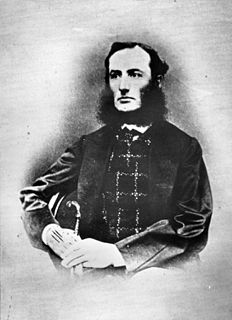Related Research Articles
William Love (1810-1885) was a member of the New South Wales Legislative Assembly for West Sydney from 1860 to 1864. Love served as Chairman of the Sydney Revenues Improvement Bill Committee.
Robert Palmer Abbott was a politician and solicitor in colonial New South Wales, a member of both the Legislative Assembly and Legislative Council.
(John) Ryan Brenan was an Australian politician and an elected member of the New South Wales Legislative Assembly for 68 days in 1856. He founded, and outlined, the suburb of Smithfield in Sydney. Furthermore, Brenan Park, which is in that suburb, was named after him.
James Thompson, or Thomson, was an Australian politician. He was a member of the New South Wales Legislative Assembly for one term between 1856 and 1857.

John Sutherland was a builder and politician in colonial New South Wales.
Sir Robert Wisdom, was a politician in colonial New South Wales and Attorney General of New South Wales.

John Fitzgerald Burns was an Australian politician, member of the Parliament of New South Wales, Postmaster-General in the 1870s and Colonial Treasurer in the 1880s.
This is a list of members of the New South Wales Legislative Council from 1843 to 1851. The 1843 Electoral Act prescribed 36 members, 24 to be elected, 6 appointed by virtue of their office and 6 nominated. The appointments and elections were for five year terms and thus occurred in 1843,</ref> and 1848. The parliament was dissolved on 30 June 1851 as a result of the 1851 Electoral Act which increased the number of members in the Council to 54.
Augustus Ryan Fraser was a politician and pastoralist in New South Wales, Australia.

Abram Orpen Moriarty was an Irish-born Australian politician.
A by-election was held for the New South Wales Legislative Assembly electorate of East Macquarie on 19 January 1882 because Edmund Webb resigned to accept appointment to the Legislative Council.
A by-election was held for the New South Wales Legislative Assembly electorate of Glebe on 10 September 1904 because James Hogue had been appointed Chief Secretary in the Carruthers ministry. Until 1907, members appointed to a ministerial position were required to face a by-election. These were generally uncontested. On this occasion a poll was required in Bingara, Glebe and Tenterfield and all were comfortably re-elected. The four other ministers, Joseph Carruthers, James Ashton (Goulburn), Broughton O'Conor (Sherbrooke) and Charles Wade (Gordon), were re-elected unopposed.
A by-election was held for the New South Wales Legislative Assembly electorate of Bingara on 14 September 1904 because Samuel Moore had been appointed Secretary for Mines in the Carruthers ministry. Until 1904, members appointed to a ministerial position were required to face a by-election. These were generally uncontested. On this occasion a poll was required in Bingara, Glebe and Tenterfield and all were comfortably re-elected. The four other ministers, Joseph Carruthers, James Ashton (Goulburn), Broughton O'Conor (Sherbrooke) and Charles Wade (Gordon), were re-elected unopposed.
A by-election was held for the New South Wales Legislative Assembly electorate of Tenterfield on 14 September 1904 because Charles Lee had been appointed Secretary for Public Works in the Carruthers ministry. Until 1907, members appointed to a ministerial position were required to face a by-election. These were generally uncontested. On this occasion a poll was required in Bingara, Glebe and Tenterfield and all were comfortably re-elected. The four other ministers, Joseph Carruthers, James Ashton (Goulburn), Broughton O'Conor (Sherbrooke) and Charles Wade (Gordon), were re-elected unopposed.
A by-election was held for the New South Wales Legislative Assembly electorate of Redfern on 23 January 1882 because of the resignation of John Sutherland, ostensibly to accept an appointment to the Legislative Council, however he never took his seat in the council.
A by-election was held for the New South Wales Legislative Assembly electorate of Tenterfield on 24 August 1874 because Robert Abbott had been appointed Secretary for Mines in the first Parkes ministry. Such ministerial by-elections were usually uncontested.
A by-election was held for the New South Wales Legislative Assembly electorate of Shoalhaven on 21 August 1871 because Thomas Garrett resigned to accept appointment as a police magistrate at Berrima.
A by-election for the seat of Northumberland in the New South Wales Legislative Assembly was held on 26 May 1884 because of the resignation of Atkinson Tighe due to ill health.
A by-election for the seat of Tenterfield in the New South Wales Legislative Assembly was held on 20 November 1884 because of the resignation of Sir Henry Parkes, stating that he was retiring from politics and that "I have no intention of seeking or accepting a seat in any future Parliament".
A by-election was held for the New South Wales Legislative Assembly electorate of Queanbeyan on 27 January 1881. The election was triggered by the resignation of James Thompson, taking up the government position of Railway Land Valuator.
References
- 1 2 "Mr John (Thomas) Dillon (1847-1888)". Former Members of the Parliament of New South Wales . Retrieved 10 June 2019.
- ↑ "Appointment of stipendiary magistrates". New South Wales Government Gazette (7). 7 January 1882. p. 103. Retrieved 28 May 2021– via Trove.
- ↑ "Writ of election: Tenterfield". New South Wales Government Gazette (12). 14 December 1882. p. 161. Retrieved 28 May 2021– via Trove.
- ↑ Green, Antony. "1882 Tenterfield by-election". New South Wales Election Results 1856-2007. Parliament of New South Wales . Retrieved 12 June 2019.